
views
- Choose open-ended questions when asking the tarot for guidance so the cards can provide more in-depth, comprehensive advice.
- A yes/no tarot reading is a good option for more specific questions. It involves asking the tarot a yes or no question and drawing a single card for an answer.
- If the tarot’s initial answer to your question seems unclear, ask follow up questions to get more guidance and clarity.
Choosing Open-Ended Questions
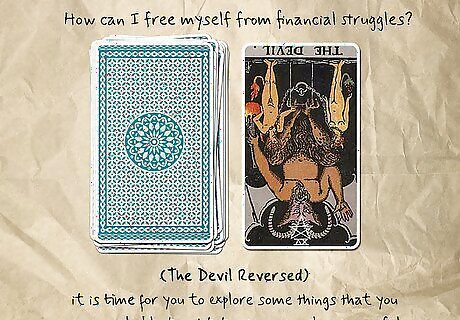
Start questions with how, what, where or why. Questions that start with how, what, where or why are open-ended, so they allow for deeper answers to some of life’s most trying concerns. Asking questions that are too specific might not leave enough room for the tarot to provide a thorough, complete answer. More open-ended questions will allow the tarot to provide in-depth advice that will help you explore how to change situations you’re unhappy with. Open-ended questions include: “How can I free myself from financial struggles?” “What areas do I need to work on to bring more love into my life?” “Where are there opportunities to help further my career?” “Why am I feeling distant from my friends?” Love tarot? Take this quiz to discover which tarot card truly matches your personality.
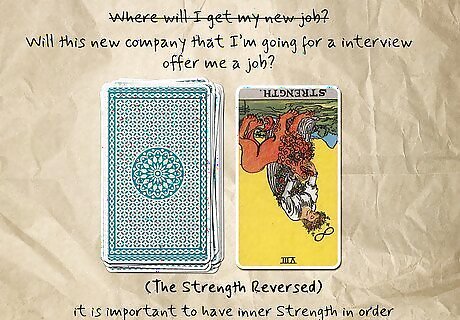
Focus on the present when coming up with your questions. "Should" questions rarely allow tarot cards to help you because they take away your power to make your own decisions. Similarly, "when" and "will" questions seek specific answers about the future, leaving you little room to change your path or make your own choices. There’s not usually an easy, cut-and-dried solution to life’s big questions. The tarot can provide wisdom and guidance, but you have the power to determine your specific course of action. Avoid will, when or should questions, and remember that the cards often can’t provide concrete answers to these hyper-specific queries. Some examples of questions not to ask the tarot include: “When is the day that l’ll get married?” This question is too specific, and the cards aren’t designed to provide the type of answer you’re looking for. “Will this company offer me a job?” This question focuses on what is going to happen, rather than asking for advice on how to navigate a situation.
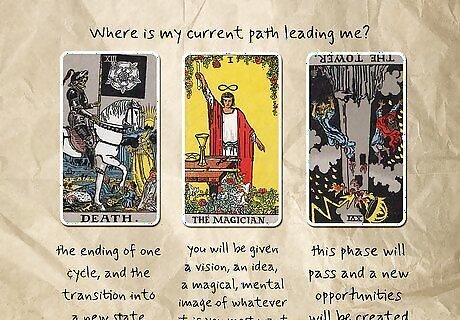
Ask a general question about your life path if you don’t have any specific queries. Sometimes, you may not have a question about a specific concern. That’s okay! Ask a question about your general life direction to receive some big-picture advice from the tarot. This leaves room for the tarot to reveal insights for situations that you may not have thought of! Here are some examples of general life path questions: “Where is my current path leading me?” “How can I find success and fulfillment?” “What areas do I need to focus on to find happiness?” “What energies are surrounding my life right now?”
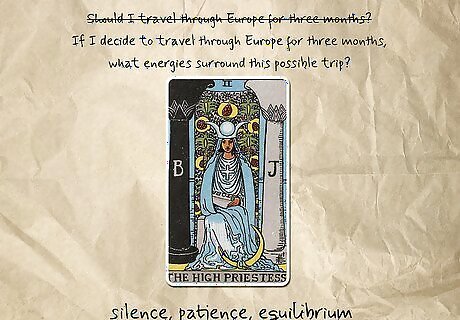
Seek guidance with your questions, rather than asking the tarot to make decisions for you. The best tarot questions are phrased in a way that helps you get guidance or advice for a concern you’re facing. The cards won’t specifically tell you exactly what you need to do—you have the ultimate power to choose your course of action. They can, however, provide some helpful insight on the energies and circumstances surrounding your current situation, so you can best decide how to move forward. Consider the following examples: Don't ask "Should I travel through Europe for three months?" This question shifts responsibility for a life decision off yourself and onto the cards. Instead, ask “If I decide to travel through Europe for three months, what energies surround this possible trip?” This question allows the cards to give you guidance without shifting responsibility.
Types of Tarot Questions to Ask

Try a yes/no reading if you want to ask simple and specific questions. A yes or no reading is also a great way to get into tarot as a beginner. Instead of a complicated spread with many cards, this type of reading involves asking the tarot one question and drawing a single card for a yes or no answer. Make sure to choose a question that can be answered with a “yes” or a “no,” and only ask a single question at a time. If the question is too vague or requires a longer explanation, the yes or no tarot reading might not be the right choice, and you might want to try another tarot spread instead. Here are some examples of yes/no tarot questions: “Am I on the right spiritual path?” “Is there a good energy surrounding my current relationship?” “Is there a positive change coming my way financially?”
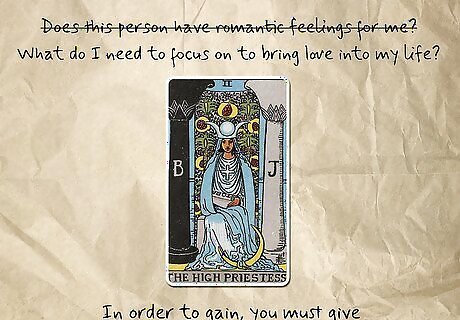
Ask questions about your side of a relationship, rather than another person’s. You might be tempted to ask the tarot about another person’s thoughts or feelings, but this would be crossing a boundary and invading the privacy of those around you. Tarot is a powerful tool for self-reflection. It’s most helpful when you’re using it to take ownership of a situation and discover your own emotions, rather than figuring out another person’s feelings. Here are some examples of shifting the focus from others to yourself in tarot questions: Instead of asking “Does my boss think I’m good at my job?” ask “Why am I feeling insecure about my professional life?” Instead of asking “Does this person have romantic feelings for me?” ask “What do I need to focus on to bring love into my life?”
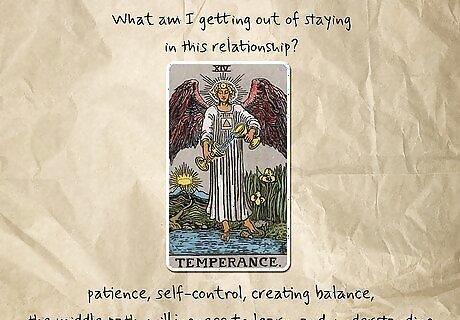
Find a question about benefits or drawbacks. You may need help making an important decision, and asking more about the potential pros and cons of this situation can help. This also allows the tarot to provide some thorough, in-depth advice to cover all aspects of your situation. If you’re struggling to know whether you should send an aging parent to an assisted living home or not: “What are the benefits of leaving my Mother at home?” “What are the drawbacks to leaving my Mother at home?” If you want to know whether a difficult relationship should end: "What am I getting out of staying in this relationship?" "How is this relationship hurting me?"
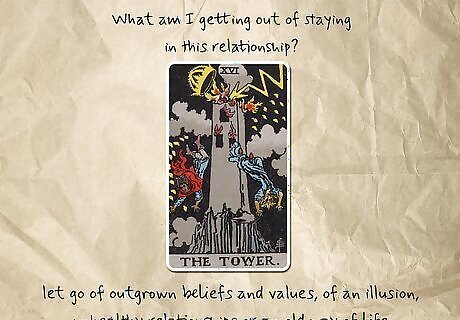
Find a situation you’d like to improve. We all have areas of our lives we’d like to make a little better. If you have some things you’d like to address or improver, ask the tarot for insight on ways you can better yourself and your quality of life. If you're not confident in your personal appearance, ask: “What can I do to feel better about how I look?” “How can I gain confidence in my physical appearance?” If you're concerned about your family life, ask: "How can I spend more time with my loved ones?" "What can I do to feel closer to my siblings?"
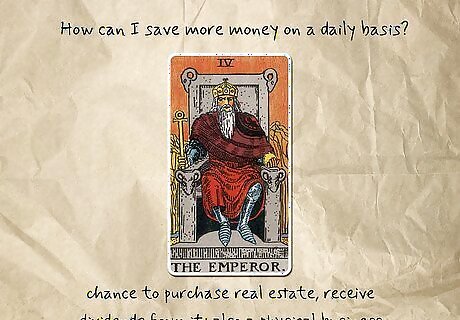
Be concise about what you ask. You may be dealing with a large, overwhelming problem, but it can always be broken down into more digestible steps. Though general questions are great if you don't have a concrete concern, breaking larger issues down into more manageable ones can help you figure out where to start. For example: Instead of asking “How can I free myself from money struggles?”, ask: “Where can additional income come from?” “How can I save more money on a daily basis?” Instead of asking "How can I make my relationship better?", ask: "Why does my spouse get upset with me when I do x,y, or z?"
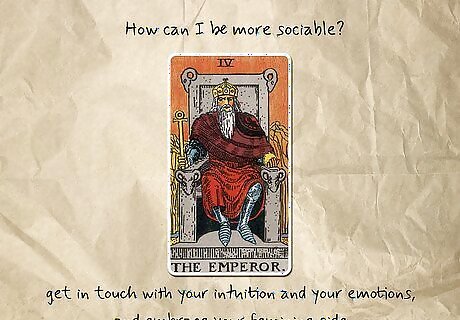
Frame your questions positively. It’s easy to get trapped into negative thinking when something isn’t going as planned. Try to approach the question with a positive mindset, and try to maintain optimism about your ability to solve the problem you’re facing. Frame questions so that they're free of negative connotations. Ask “What can I do to be a better public speaker?” instead of “Why am I bad at public speaking?” Ask "How can I be more sociable?" instead of "Why can't I make more friends?"
Adding Follow-Up Questions
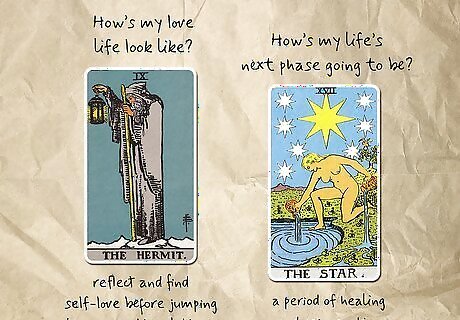
Ask the tarot a follow-up question if you need clarity. Whether you’re going to a professional or exploring tarot cards on your own, a follow-up question can help clarify the tarot’s advice if you’re confused. At first, you may draw a card that doesn’t seem to relate to your situation. Asking another question and pulling some extra cards can help you get clarity. On the surface, The Hanged Man card seems to represent powerlessness, but it can also represent surrendering in order to gain a new perspective. When you ask a follow-up question, you could pull a card that clarifies this, like the 8 of Cups. This card represents letting go so you can move forward. If you draw The Hermit card when asking about your love life, you might assume it means you’re going to be alone. The Hermit is actually about gaining inner wisdom. It could be encouraging you to reflect and find self-love before jumping into a romantic relationship. When you ask a follow-up question, you might draw The Star, which represents a period of healing and rejuvenation.
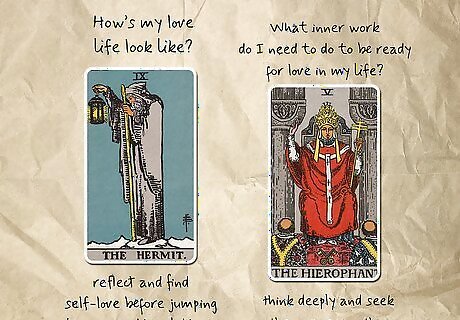
Build on your original question. When picking a follow-up question, choose a question that’s slightly more specific (but still related to) your original query. For example, imagine you asked the question “Will I find love in my life?” and pulled a confusing tarot card for an answer. Asking a few more detailed follow-ups can help you get some clarity. Here are some examples of what this could look like: “What can I do to invite more love into my life?” “What actions will bring me closer to my future romantic partner?” “What inner work do I need to do to be ready for love in my life?”
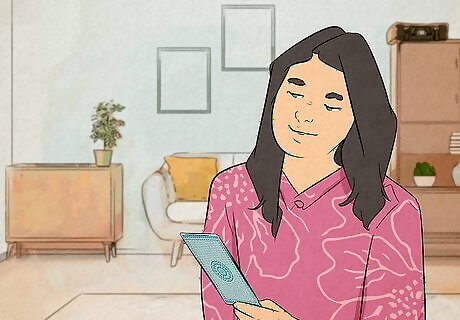
Notice your reaction to cards. The way you respond to cards as they’re laid can give you valuable insight into how you’re dealing with certain situations. What emotions come up when you draw each card? What feelings do the illustrations spark in you? To keep track of your reactions, write them down. This will give you the chance to review them, reflect, and choose follow-up questions based on your emotions. If you’re looking to purchase a journal to document your tarot journey, there are several great ones available! Modern Witch Tarot Journal is a great option. It includes the illustrations from the Modern Witch Tarot Deck, which is also a great option if you’re looking to purchase your own deck of tarot cards.




















Comments
0 comment